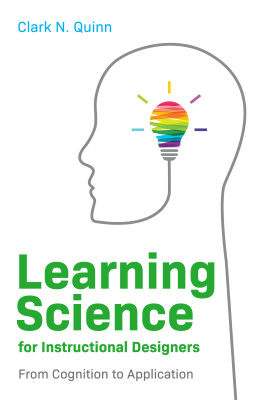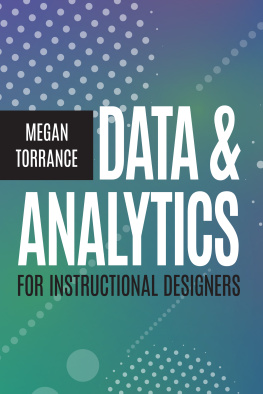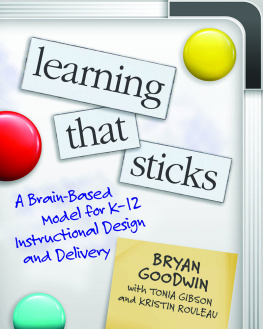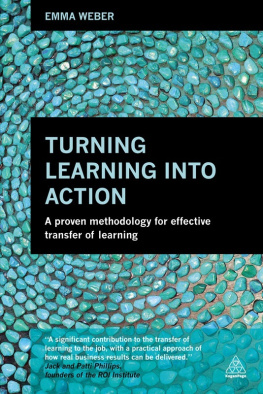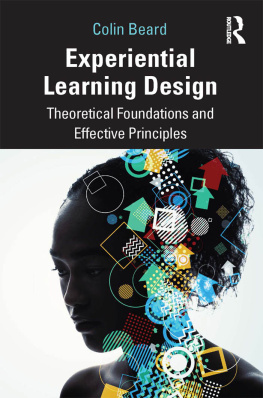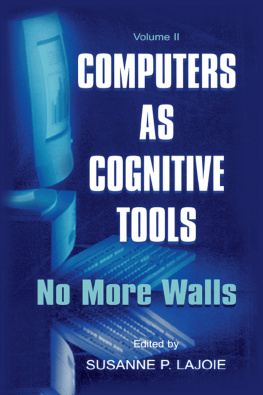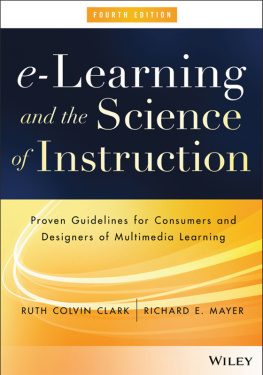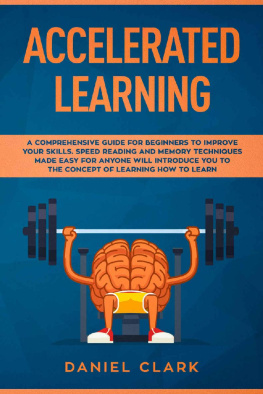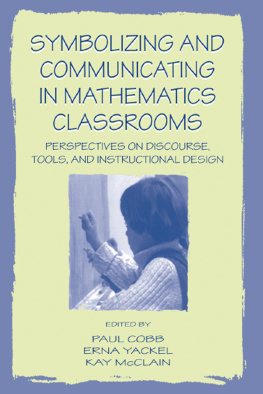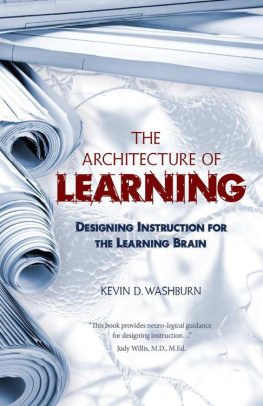Clark N. Quinn - Learning Science for Instructional Designers: From Cognition to Application
Here you can read online Clark N. Quinn - Learning Science for Instructional Designers: From Cognition to Application full text of the book (entire story) in english for free. Download pdf and epub, get meaning, cover and reviews about this ebook. year: 2021, publisher: Association for Talent Development, genre: Romance novel. Description of the work, (preface) as well as reviews are available. Best literature library LitArk.com created for fans of good reading and offers a wide selection of genres:
Romance novel
Science fiction
Adventure
Detective
Science
History
Home and family
Prose
Art
Politics
Computer
Non-fiction
Religion
Business
Children
Humor
Choose a favorite category and find really read worthwhile books. Enjoy immersion in the world of imagination, feel the emotions of the characters or learn something new for yourself, make an fascinating discovery.
- Book:Learning Science for Instructional Designers: From Cognition to Application
- Author:
- Publisher:Association for Talent Development
- Genre:
- Year:2021
- Rating:5 / 5
- Favourites:Add to favourites
- Your mark:
- 100
- 1
- 2
- 3
- 4
- 5
Learning Science for Instructional Designers: From Cognition to Application: summary, description and annotation
We offer to read an annotation, description, summary or preface (depends on what the author of the book "Learning Science for Instructional Designers: From Cognition to Application" wrote himself). If you haven't found the necessary information about the book — write in the comments, we will try to find it.
Clark N. Quinn: author's other books
Who wrote Learning Science for Instructional Designers: From Cognition to Application? Find out the surname, the name of the author of the book and a list of all author's works by series.
Learning Science for Instructional Designers: From Cognition to Application — read online for free the complete book (whole text) full work
Below is the text of the book, divided by pages. System saving the place of the last page read, allows you to conveniently read the book "Learning Science for Instructional Designers: From Cognition to Application" online for free, without having to search again every time where you left off. Put a bookmark, and you can go to the page where you finished reading at any time.
Font size:
Interval:
Bookmark:


2021 ASTD DBA the Association for Talent Development (ATD)
All rights reserved. Printed in the United States of America.
24 23 22 21 1 2 3 4 5
No part of this publication may be reproduced, distributed, or transmitted in any form or by any means, including photocopying, recording, information storage and retrieval systems, or other electronic or mechanical methods, without the prior written permission of the publisher, except in the case of brief quotations embodied in critical reviews and certain other noncommercial uses permitted by copyright law. For permission requests, please go to copyright.com, or contact Copyright Clearance Center (CCC), 222 Rosewood Drive, Danvers, MA 01923 (telephone: 978.750.8400; fax: 978.646.8600).
ATD Press is an internationally renowned source of insightful and practical information on talent development, training, and professional development.
ATD Press
1640 King Street
Alexandria, VA 22314 USA
Ordering information: Books published by ATD Press can be purchased by visiting ATDs website
at td.org/books or by calling 800.628.2783 or 703.683.8100.
Library of Congress Control Number: 2021930866
ISBN-10: 1-952157-45-5
ISBN-13: 978-1-952157-45-5
e-ISBN: 978-1-952157-46-2
ATD Press Editorial Staff
Director: Sarah Halgas
Manager: Melissa Jones
Content Manager, Science of Learning: Alexandria Clapp
Developmental Editor: Jack Harlow
Production Editor: Hannah Sternberg
Text Design: Shirley E.M. Raybuck and Stephanie Shaw
Cover Design: Rose Richey
Printed by BR Printers, San Jose, CA
To all the researchers who advance our understanding of
learning, and the designers who apply that research to create
effective and engaging learning experiences.
If were truly being professionals about designing learning, theres a clear onus to be aware of what learning science tells us. And that runs from the cognitive story at the core through to the learning prescriptions that emerge. Quite simply, we have a responsibility.
If a doctor pursues approaches unjustified by science, theyre liable for malpractice. Similarly, we should be implementing scrutable practices. There are consequences for not doing so. If we use approaches that arent justified, we can squander resources, but more importantly, we can undermine our own goals. In the worst case, lives are lost. In fact, youll see that industries with significant potential downsides of getting it wrong practice in ways not typically seen in corporate America. Look at the military and airlines as two examples.
So, we have a responsibility to our learners, our organizations, and ourselves to understand and apply whats known, whether from a deep-seated curiosity and caring, or just because its whats required of us.
I come from the former category. I was kind of at loose ends, degree-wise. I was tutoring (physics, calculus, chemistry) on campus for some extra income, and taking some computer science courses. I ended up doing computer support for the office that coordinated the tutoring. And a light went on: computers supporting learning! My university didnt have an appropriate degree program (back then, many didnt; I was carrying around decks of punch cards in order to run the computer programs), but it did have a way to design your own. So, thats what I did, and learning design and technology has been my career ever since.
Ive programmed educational computer games; gone back for a PhD in what was, effectively, applied cognitive science; and gone the academic route: a post-doctoral and then a faculty position. For complicated reasons, I also joined some government-sponsored initiatives in online learning before joining a startup in educational technology. When that went four paws to the moon in the economic chaos that characterized the collapse of the internet bubble, I ended up as a consultant (which went from being a euphemism for unemployed to a way of life). However, my career has always been about exploring ways to use technology that allow us to pursue our goals more effectively and efficiently.
Along the way, Ive maintained a passionate interest at the intersection of four related fields. Ive looked at learningbehavioral, cognitive, post-cognitive, social, educational, even machine learningto see whats known. Similarly, Ive followed whats known about engagement, including motivation, anxiety, curiosity, drama, and humor, to understand how we create experiences that are meaningful, even transformative. Ive also followed technology trends from before personal computers, including artificial intelligence, mobile, content systems, constructed realities (augmented and virtual), and more, to find out what new capabilities we might use. Finally, Ive looked at design, including interaction, industrial, graphic, software engineering, and of course instructional approaches, to ensure that were applying this knowledge in the most useful ways.
Thats my mission: Discover how to create experiences that tap into our hearts and apply our minds to achieve useful ends. Its all about strategic learning experience design (LXD). (And through technology, since Im admittedly a sucker for the latest toy.) Which means I have looked at practical ways to integrate this suite of knowledge. Here, Im focusing on learning, and its application to instruction.
And, as youll see, our brains consolidate information. We dont remember many exact details; instead, we remember a synthesis. And thats what Im doing here. This is not a detailed academic treatise, but rather an attempt to digest and communicate a practical interpretation of whats known about cognition and learning to provide a basis for better design.
I hope you find it comprehensible and useful.
There are so many people I owe gratitude to, and Ive tried to catalog them in previous books. A few who continue to support me include the following.
Jim Sky Schuyler has been a mentor, colleague, and friend since out of college and continuing on. A great role model.
Marcia Conner has been a mentor at stages in my career, providing opportunities and helping me learn important lessons.
My Internet Time Alliance colleagues, instigated by the late, great Jay CrossJane Hart, Harold Jarche, and Charles Jenningsall have served to improve my understanding of learning and life.
My IBSTPI colleagues, including Mark Lee, Kathy Jackson, Davida Sharpe, Fernando Senior, Saul Carliner, Florence Martin, and Stella Porto, have been sources of inspiration and learning.
Thanks also to all my colleagues in many different forums; in particular (and in no particular order), Will Thalheimer, Karl Kapp, Patti Shank, Julie Dirksen, Mirjam Neelen, Donald Clark, Jane Bozarth, Jen Murphy, Chad Udell, Connie Malamed, Matthew Richter, Guy Wallace, and the other mythbusters and science interpreters have all helped shape my rigor and understanding. Apologies if I havent mentioned you! And Im grateful to so many more colleagues who inspire me and support us all in doing better.
Im grateful to all the organizations that have given me platforms to share my thinking on how to improve the field, through workshops, keynotes, talks, articles, books, and courses. Thanks to societies, publishers, private organizations, individuals, and more.
Also, thanks to the organizations that have brought me in to work with them. Its a deep pleasure to be able to get hands-on with real problems and try to Quinnovate some new ideas. Ive learned so much from these opportunities with public and private companies, not-for-profits, governmental bodies, educational institutions, and more.
Next pageFont size:
Interval:
Bookmark:
Similar books «Learning Science for Instructional Designers: From Cognition to Application»
Look at similar books to Learning Science for Instructional Designers: From Cognition to Application. We have selected literature similar in name and meaning in the hope of providing readers with more options to find new, interesting, not yet read works.
Discussion, reviews of the book Learning Science for Instructional Designers: From Cognition to Application and just readers' own opinions. Leave your comments, write what you think about the work, its meaning or the main characters. Specify what exactly you liked and what you didn't like, and why you think so.

